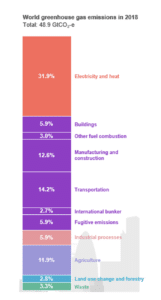Bertrand Lecourt, senior portfolio manager at J O Hambro, considers waste management’s contribution to sustainable development, notably how poor waste management is having a negative effect globally.
As populations, urbanisation and consumption grows, so does waste generation and with it the need for sustainable waste management. While individuals and companies are becoming more waste conscious, waste remains an inevitable by-product of life. Even under fully circular economic models, that utilise eco-product design to avoid waste from the outset and optimise for reuse and recyclability, material integrity declines through repeated cycles such that there will always be some waste to manage.
As a result, both now and in the future, waste solution providers play a critical role in helping communities and industries dispose of waste in the most environmentally responsible and cost-effective ways.
The costs of waste collection are significant. However, the costs of ignoring waste are potentially much greater.
The World Bank compared estimates of economic cost of uncollected household waste that is burned, dumped, or discharged to waterways, with integrated waste management costs for South-East Asia. It found that basic waste management systems (meeting good international hygiene standards) equated to US$50–100 per metric tonne; far less than the economic cost of leaving waste untreated of US$375 per metric tonne.
The issue
Population growth, rising standards of living, industrialisation and enhanced production and consumption of new products are together contributing to greater solid waste generation. The world generates 2 billion tonnes of municipal solid waste annually, with at least 33% of that not managed in an environmentally safe manner. Issues relating to waste collection and removal are particularly acute in the developing world, where less than 50% of waste is collected in cities and only around 25% outside of urban areas.
The increasing volume and complexity of waste is creating a serious risk to ecosystems and human health, due to inadequate and ineffective waste management and disposal techniques. Poor waste management – ranging from non-existent collection systems to ineffective disposal – is a key contributor to significant air, water, marine and soil degradation. Moreover, unmanaged waste sites contribute to the contamination of drinking water and create breeding grounds for mosquitoes, resulting in poor health outcomes.
See graphic below.
So, what are the potential solutions?
Waste Collection
Effective waste collection and management infrastructure ensure materials are recycled and re-used, where possible, or safely disposed, supporting sustainable waste management. Management of hazardous waste is particularly important to reduce negative impacts on the environment via pollution and health of local populations.
Recycling and Reuse
Recycling and reuse are a core component of creating a closed loop system and optimising global resource efficiency in consumption and production. By producing new products from recovered materials, recycling saves a significant amount of energy during manufacturing and end-of-life treatment and reduces the volume of virgin resource extraction and attendant impacts.
Energy Recovery
A complementary solution to renewables and fuel switching in pursuit of global decarbonisation and sustainability goals, waste-to energy plants involve burning of waste that could not be prevented or recycled. Generated energy that may replace energy sourced from fossil fuels. When compared to landfills, which release significant volumes of methane emissions, waste-to-energy can reduce GHG emissions. For example, Project Drawdown estimates 2-3 gigatons of CO2 can be reduced by waste-to-energy plants between 2020 and 2050.
Landfill Gas Capture
Effective management of landfills with gas collection systems can significantly reduce GHG emissions by, for example, capturing methane and recovering energy. Landfills which include liner, cover and leachate collection systems, environmental and post-closure plans – prevent degradation of water systems (from waste entering water streams) and air pollution.
Conclusion
To conclude, while the broader sustainability credentials of effective waste management are readily acknowledged, there have been some lingering questions about the carbon footprint of waste management, which contributes about 3.3% of total global emissions. This is well below sectors such as agriculture, industrial processes, manufacturing and construction and buildings.
Even though waste management is nowhere near the largest contributor to climate change, global decarbonisation goals need every sector to achieve reductions. Low carbon transition is a critical question to examine for every investment.
Source: Greenhouse gas emissions on Climate Watch, www.climatewatchdata.org. Latest data available.




































